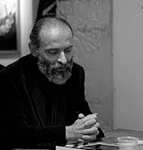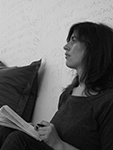Five Poems
 My country,
My country,
why this crazy love for you?
You got me born
so I could be your wound.
Where can I hide
on the barren hill?
My verses dog me
like old murderers.
And deep in my ice
every night
something breaks.
With your name I’ll name
the curve you lean on
like light and shadow.
Your name I’ll call the robin
on the iced creek,
and the serpent that you saw
on the wind’s path
and the flowers you trod
in summer dark,
the burned out fires
on the bare hills,
the call of crows.
All the rains in the world
I’ll name with your name.
Of those dreams nothing remains—
the houses stand locked-up for good.
Under the stones
you won’t even find a key;
they brought them along, the dead.
It rains constantly
in this
country.
Maybe because I’m a stranger.
I want the pages of my books
to be what starts a fire in the cottage
of two cold lovers.
*
To turn oneself into dust,
ashes,
To feel
a little bit oneself
a little bit the universe.
To live the silence.
Mia patria,
perché quest’amore folle per te?
Tu mi hai fatto nascere
per essere la tua ferita.
Dove nascondermi
nella collina brulla
I miei versi m’inseguono
come vecchi assassini.
Ogni notte si rompe qualcosa
nel profondo del mio ghiaccio.
Con il tuo nome chiamerò
la curva dove ti affacci
come luce e ombra.
Anche il pettirosso
sul giaccio del ruscello,
anche il serpente che hai visto
nel sentiero di vento
anche i fiori che hai calpestato
al buio estivo,
anche i fuochi spenti
sulle colline nude,
il richiamo dei corvi.
Tutte le piogge del mondo
con il tuo nome chiamerò.
Nulla è rimasto di quei sogni,
le case sono serrate per sempre.
Sotto le pietre
non troverete neanche le chiavi,
le hanno portato con sé i morti.
Piove sempre
in questo
Paese.
Forse perché sono straniero.
Voglio che con le pagine dei miei libri
accendano il fuoco nella casa di campagna
gli innamorati infreddoliti.
*
Farsi polvere,
cenere,
oblio
Sentirsi
un po’ se stessi,
un po’ universo.
Abitare il silenzio.
Translator’s Note
We elude ourselves. Glancing in a mirror or hearing my recorded voice I think “but that’s not what I look like/sound like.” Worse, though I believe that home exists, I cannot seem to figure out where that home is. If this sense of dislocation is a side-effect of being human, then the figure of the exile is its highest expression. Hajdari’s mournful, limpid poems place us inside our divided lives and press on the tender spot of our own feelings of homelessness.
I moved to Italy to work with Gëzim Hajdari on the translation of his poems. Hajdari moved to Italy as a young man in flight from the oppressive communist regime of his native Albania. Hajdari traveled to make them, and I traveled to translate them; the poems themselves are the only native Italians. They stand between translator and writer, exile and ex-pat. In some ways, this atypical situation facilitated translation. Usually when I translate I must attempt to inhabit the mother tongue, the native instincts, and at times even the subconscious of the author. It can feel like trespassing. In contrast, Hajdari and I meet on borrowed ground in the fertile, liminal territory of a third language.
The special autonomy of these poems creates new kinds of translation challenges. Hajdari’s language is often deceptively simple. His poems contain many landscape elements; they evoke the earthy intimacy of his rural Albanian boyhood. But it is to a landscape remembered, not lived, that the poems speak. In Italian, the familiar names of trees and animals become strange, distant, and yet because distant perhaps even more longed for. How is it possible to convey that distance anew in a translation? What happens to nostalgia—the first language—when expressed in a second language?
Hajdari sometimes uses Italian to chastise his mother tongue and his country: “you got me born/so I could be your wound,” he says in one poem. There are moments in which he seems to feel permanently alienated by his existence in his second language; he and other exiles are “leaving for a country that calls not your name but your body.” In another poem he says “I’m living in place of myself now” as if the entire Albanian self were abandoned along with the country.
Yet these melancholy comments on exile are balanced by a kind of liberation (quite familiar to us as Americans I suspect) that comes with rootlessness. After he imagines, in one poem, that his books will one day start a fire in the house of two cold lovers, he says “To feel/ a little bit oneself/ a little bit the universe.” What a poignant articulation of one of the ways in which great happiness expresses itself; when that elusive, seeking self appears both within and without, present and distant. It is to remember this feeling, our human belonging and our human lostness, that I return again and again to poetry.
 Born in Lushnje, Albania in 1957, Gëzim Hajdari was persecuted by the communist regime and fled to Italy in 1992 where he has since resided. He is a prominent member of the “Scrittori Migranti” movement in Italy, a group of writers who intentionally eschew their first language, choosing instead to write in Italian. Hajdari has earned acclaim both in Italy and abroad for his poems, winning the prestigious Montale prize among others. His work speaks to his experience as an exile, his deep-seated love and equally profound frustration with his native Albania, and the shifting, uncomfortable identity he inhabits.
Born in Lushnje, Albania in 1957, Gëzim Hajdari was persecuted by the communist regime and fled to Italy in 1992 where he has since resided. He is a prominent member of the “Scrittori Migranti” movement in Italy, a group of writers who intentionally eschew their first language, choosing instead to write in Italian. Hajdari has earned acclaim both in Italy and abroad for his poems, winning the prestigious Montale prize among others. His work speaks to his experience as an exile, his deep-seated love and equally profound frustration with his native Albania, and the shifting, uncomfortable identity he inhabits.

 Sarah Stickney received her MFA from the University of New Hampshire. She is a former Fulbright Grantee for the translation of Italian/Albanian poet Gëzim Hajdari. Her co-translations of Elisa Biagini’s selected poems, The Guest in the Wood, was chosen by the University of Rochester for its Best Translated Book Award for poetry in 2014. Her poems and translations have appeared both in the U.S. and abroad in publications such as La Questione Romantica, Rhino, The Portland Review, Drunken Boat, Cold Mountain Review, and others. She lives in Annapolis, MD where she teaches at St. John’s College.
Sarah Stickney received her MFA from the University of New Hampshire. She is a former Fulbright Grantee for the translation of Italian/Albanian poet Gëzim Hajdari. Her co-translations of Elisa Biagini’s selected poems, The Guest in the Wood, was chosen by the University of Rochester for its Best Translated Book Award for poetry in 2014. Her poems and translations have appeared both in the U.S. and abroad in publications such as La Questione Romantica, Rhino, The Portland Review, Drunken Boat, Cold Mountain Review, and others. She lives in Annapolis, MD where she teaches at St. John’s College.


